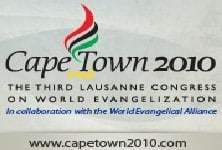
Here are some questions for you: What are the key trends occurring in the church globally which we should be aware of? What are some of the most significant challenges facing the Western church? If we could change one thing in the American church, what would it be? What are the biggest obstacles we face in following Christ here in the West? What does the church in the United States need to learn from the worldwide church? What is our responsibility as followers of Christ as we engage a culture that is increasingly global and post modern? What are some ways you would like to see individual followers of Christ engage and create culture for the glory of God in the next decade?
These were questions asked to me and several other Christian leaders tonight here in Orlando as we joined a larger conversation on the future of the church here and around the world.
Last night’s dinner was part of a multi city conversation in preparation for the Third Lausanne Congress to be held in Cape Town South Africa this October. It was a privilege to be able to represent Reformed Theological Seminary in Orlando and interact on a panel with Andy Crouch, (Senior Editor of CT), Stephen Douglas, (President of Campus Crusade for Christ), Jessie Miranda, (President of National Hispanic Leadership), Mark Dever, (Senior Pastor of Capitol Hill Baptist Church), Doug Birdsall, (Executive Chairman for Lausanne Committee on World Evangelization), Bob Creson, (President, Wycliffe Bible translators) and Brad Lomenick, (Director of Catalyst).
Some history. The Lausanne Congresses are the closest thing evangelicals in the world have to a church council. Rome holds Vatican Councils. The World Council of Churches holds its large assemblies. Evangelicals have Lausanne. This movement was started in 1974 when the first congress was convened by Billy Graham, John Stott and others in order to mobilize the global church for evangelism.
Its current leaders hope to see the gospel of Jesus Christ taught and applied more effectively in all contexts. Its passion has been to see a new and urgent commitment to world evangelization by “the whole church, to take the whole gospel into the whole world.” The hope is that the church will have new commitment, new courage, as well as new strategies and partnerships to fulfill the Great Commission for the next generation.
Why another large council? Councils arise out of new situations that the church finds itself in. It has always been that way. The early church councils arose because of some new challenge to the church—the rise of Arianism, or Pelagianism, or the Christianization of the Roman Empire.
Think of how the world has changed since the last Lausanne Congress in 1989. We have seen the collapse of communism, the unbottling and radicalicalizing of Islam, the wiring of the world through the internet, the acceleration of globalism, and urbanization, the continued growth of mega cities, the shifting of the center of Christianity from the West to the South and the East. Each of these changes has brought new challenges to the church. A congress like this gives Christian leaders an opportunity to confess their faith (the uniqueness of Christ and the abiding importance of his cross and resurrection) in a new cultural situation.
The Lausanne gathering also provides an opportunity for building relationships and partnerships among Christian leaders. Now more than ever, in this global age, we must work together to proclaim Christ and fulfill the Great Commission.
Finally, a council like this highlights the shifting leadership in the church. Billy Graham and John Stott are passing from the scene. Dr. Graham and Dr. Stott are now both frail. But the Congress highlights the passing of the Christian torch to a new generation of leaders who must also be faithful in this time.
The council will highlight the importance of evangelism and strategies for reaching all kinds of people. It will focus on some of the things that need to be fixed in the church in order for our witness to be more credible. Its members will consider how to reach the yet unreached people groups of the world, as well as challenge participants to a new courage in order to proclaim our faith in an increasingly hostile world.
So pray for this gathering in October, and learn more about the Lausanne movement by going to www.lausanne.org.
